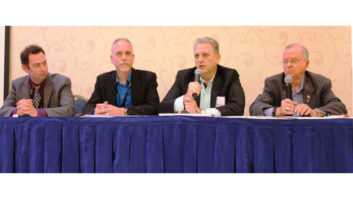 A missed deadline led the Federal Communications Commission to issue a monetary forfeiture for $1,500 to the licensee of an FM translator station — despite the licensee’s protestations that the Media Bureau had overstepped its bounds.
A missed deadline led the Federal Communications Commission to issue a monetary forfeiture for $1,500 to the licensee of an FM translator station — despite the licensee’s protestations that the Media Bureau had overstepped its bounds.
The FCC rules require that station license renewal applications be filed no later than the first day of the fourth month prior to the expiration of the license. For FM translator W275CC in Macon, Ga., the application for renewal should have been filed by Dec. 2, 2019, prior to the expiration date of April 1, 2020. The licensee, LLF Holdings, filed the application on March 17 and provided no explanation for its untimely filing, the Media Bureau said in its forfeiture order.
Violations like these have a base forfeiture of $3,000. But the Media Bureau reduced the proposed forfeiture in this case to $1,500 because the station is one that provides a secondary service. The bureau gave the licensee 30 days to either pay the full amount of the forfeiture or submit a written statement seeking reduction or cancellation.
[Read: Another Translator, Another Fine]
Soon after, LLF Holdings responded to the bureau to admit that while it did not file its renewal application on time, it had had several points of contention with the Media Bureau’s decision. The first, LLF said, was that the bureau erred in not granting its renewal application at the same time it issued the Notice of Apparent Liability.
Secondly, LLF said that the proposed forfeiture should simply be cancelled outright. Specifically, the licensee argued that section 504(c) of the Communications Act of 1934 actually bars the commission from “making the payment of a civil forfeiture a condition precedent to the grant of an application.” LLF went on to say that civil forfeitures are only recoverable in new proceedings brought in federal district court.
LLF had a few other concerns: one, that FCC rules and its forfeiture policy statement do not include a forfeiture provision for late-filed renewal applications. Secondly, LLF said the bureau did not put it on notice about the potential forfeiture, which the licensee claims is in violation of the Administrative Procedure Act. And finally, LLF argued that the commission has treated other licensees differently, like when it granted late-filed renewal applications for translator stations in Georgia and Alabama without imposing a fine.
But the Media Bureau rejected all of LLF’s arguments. It said that sending out the Notice of Apparently Liability was part of the renewal process and that withholding the grant of the renewal until a forfeiture is paid is consistent with statute and case law. The Communications Act gives the commission the authority to impose a forfeiture against any licensee that fails to comply with its rules, the bureau said. “The commission expects, and it is each licensee’s obligation, to know and comply with all of the commission’s rules.” Moreover, the bureau said it has a long made it clear that failure to file a timely renewal application is grounds for the issuance for a monetary forfeiture.
As to LLF’s other arguments, the bureau said no case law was provided to show that the bureau is precluded from withholding a renewal application pending payment of a forfeiture issued in the same proceeding involving that application.
When it comes to the FCC not imposing a fee on other late filed application, the bureau reminded LLF that the bureau gives licensees a 30-day grace period in which to file renewal applications following the filing deadline without imposing a monetary forfeiture. The Georgia and Alabama stations cited by LLF filed their applications within 30 days of the filing deadline. LLF did not file its renewal application until March 17, 2020, the bureau said, well over three months past the filing deadline and outside the 30-day grace period.
As a result the Media Bureau found that LLF is still liable for a monetary forfeiture of $1,500.









